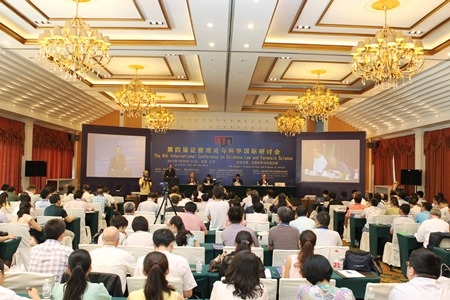
The 4th International Conference on Evidence Law and Forensic Science (“ICELFS 2013”) has been successfully held during 2013 July 20-21 in Beijing, which was co-hosted by P.R.C. “2011 Plan” – China Collaborative Innovation Center of Judicial Civilization (“CICJC”) and International Association of Evidence Science (“IAES”), while organized by Institute of Evidence Law and Forensic Science, CUPL, and supported by Key Laboratory of Forensic Toxicological Analysis of the Ministry of Public Security. The ICELFS 2013 was attended by more than 150 delegates from 11 countries and regions, including more than 130 delegates from Mainland China and Taiwan as well as more than 20 delegates from U.S., U.K., Spain, Italy, Netherlands, Hungary, Switzerland, Australia, South Korea, etc. Participants had comprehensive discussions under the theme of ICELFS 2013 – Evidence Science and Judicial Civilization.
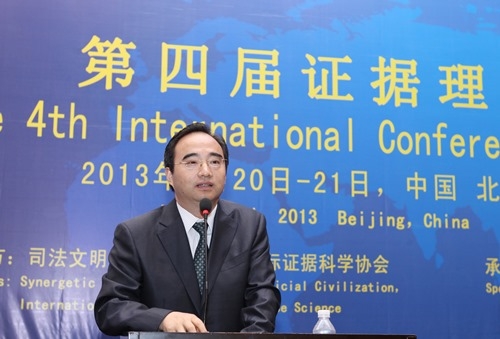
At the Opening Ceremony of Conference, Professor Jin Huang (President of China University of Political Science and Law) made opening remarks and expressed warm congratulations on the convening of the Conference. He noted that this conference paid great attention to the combination of theory and practice, the communication between evidence law jurists and forensic scientists, and the international dialogues between experts in China and around the world; it had been growing into an important platform for the interdisciplinary communication among worldwide evidence law jurists and forensic scientists. Meanwhile, he pointed out that ICELFS had also been transforming into a brand of CUPL in the field of international academic exchanges. The “2011 Plan” of China Collaborative Innovation Center of Judicial Civilization co-hosted this Conference, injecting new vitality to ICELFS and providing a platform for the further development of ICELFS.
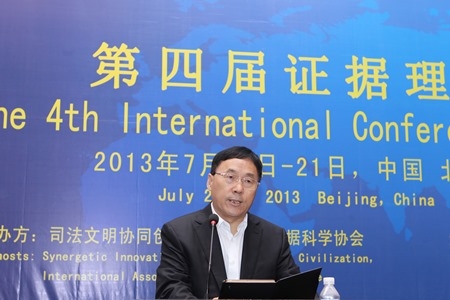
The board chairman and co-director of the “2011 Plan” - China Collaborative Innovation Center of Judicial Civilization, Professor Wenxian Zhang pointed out in his speech that with the growing of the progress of rule of law, the protection of human rights and procedural justice, the issue of evidence has become the key theoretical issues in Chinese procedure laws and the Chinese law society as a whole; also, it has become the main practical issue of correct application of law in Chinese judicial organs. The development of evidence law and the innovation of theory of evidence are necessary requirements of promoting judicial civilization. Judicial civilization is the core content and main symbol of modern political civilization and the basic mark and important guarantee of social civilization. Judicial civilization has five pivots, which are scientific judicial theory, advanced judicial system, fair judicial operation, outstanding judicial elites and rational judicial culture. The evidence law is through the five pivots: the scientific judicial theory cannot do without scientific theory of evidence; the fair judicial operation depends on strict and impartial rule of evidence; the outstanding judicial elites must have strong consciousness of evidence and profound knowledge of evidence; also, the rational judicial culture inevitably includes the rational evidence culture from the society at large. Therefore, in order to promote the judicial civilization, it is necessary to strengthen the research of evidence law and the innovation of evidence system. Professor Wenxian Zhang expressed that CICJC will continue paying attention to and support the research of evidence science and the construction of evidence law system; actively contact and cooperate with IAES and experts of evidence science from all the countries; more effectively organize domestic and international academic exchange and interact with judicial organs; also, CICJC will jointly promote the development and progress of Chinese and the world’s evidence system, litigation system and judicial system and promote the rule of law and political civilization.
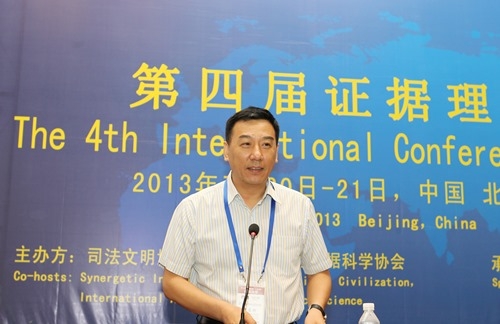
The director of the Department of Social Sciences of P.R.C. Ministry of Education, Professor Donggang Zhang addressed in his speech that the organizers of the Conference has been upgraded to CICJC and IAES, which shows that the Institute of Evidence Law and Forensic Science has made encouraging progress. The theme of this Conference is “Evidence Science and Judicial Civilization”, which reflects the close relationship of evidence science and the construction of judicial civilization. The major task of CICJC is to explore the scientific judicial theory, to construct advanced judicial systems, to promote fair judicial operation, to train outstanding judicial elites and to foster rational judicial culture. CICJC will provide strong theoretical and talents support for “deepening the reform of judicial system and constructing fair, efficient and authoritative socialist judicial system”, which is very meaningful for promoting the construction of ruled by law in China.
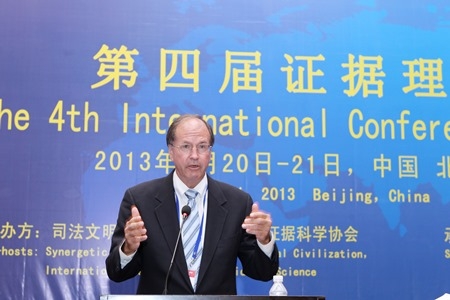
The President of IAES, John Henry Wigmore Professor of Law at Northwestern University School of Law, Professor Ronald J. Allen expressed his gratitude to all the participants on behalf of IAES. Professor Allen addressed that evidence law is of great significance for legality and civilization. Evidence law is a common point, which is shared by reason and human culture; it is universal human logic and knowledge coherence, making the world’s evidence law research become common. Evidence law has become an important area of China’s legal system construction, but the current research of evidence is not enough; therefore, this international conference is of great importance.
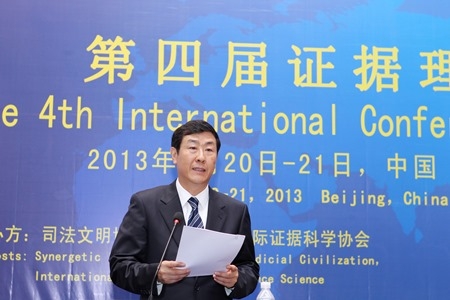
The Vice Chief Justice of the P.R.C. Supreme People’s Court, Justice Deyong Shen, pointed out in his speech that, the holding of the International Conference of Evidence Law and Forensic Science had importance significance for the theory and practice of evidence law. Evidence is the foundation of justice; it plays a key role in the proceedings. Chinese legislative and judicial branches made continuous efforts to perfect evidence system, to promote judicial civilization, and to guarantee judicial justice. The 2012 revisions of PRC Criminal Procedure Law and Civil Procedure Law were important interim achievements. The reform and development of evidence system is not the work of one single day and cannot be completed once for all. There is still a long way with heavy burden ahead. We should establish the principle of criminal evidence, the principle of presumption of innocence, evidentiary adjudication, procedure rule of law and other modern ideas of criminal justice. We should keep a frequent interaction with practicing professionals and strengthen the research of evidence law; strictly function as the gatekeeper in proof for the administration of justice and resolutely prevent unjust, false and wrongful cases.
After the opening ceremony, Professor Allen delivered a keynote speech on topic of “Framework for the Reform of Evidence”, Professor Christophe Champod from University of Lausanne, Switzerland, gave the keynote speech of “the Understanding of DNA Evidence and Expert Opinion about DNA Transfer Issues”, Michele Taruffo from University of Pavia, Italy, gave the keynote speech of “Evidence, Facts and Legal System”, Professor Long Zongzhi from Sichuan University, gave the speech of “the ‘Pain Rules’ and Related Issues on Exclusion of Illegal Verbal Evidence in China”, and made legal analyses about the “Nie Shubin Case” from the perspective of evidence.
From the afternoon, July 20th, the Conference was divided into two parts which were evidence law session and forensic science session. The participants made in-depth exchanges of views. At the evidence law session, both Chinese and foreign delegates delivered speeches on hot issues in theory and practice of evidence law, and answered each others’ questions. At the forensic science session, forensic scientists gave speeches about forensic science, material evidence techniques and other related issues. After one and a half days of the conference proceedings, delegates reached consensuses on key issues of evidence science and exchanged views and opinions.
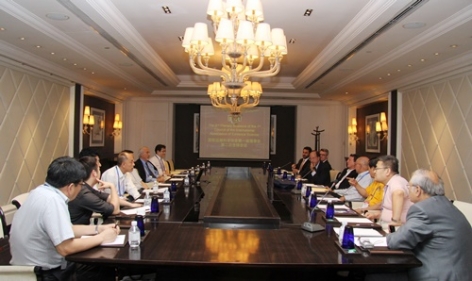
On July 21 afternoon, the 2nd Plenary Session of the 1st Council of the International Association of Evidence Science was held, discussing the work of the association in the past two years and the working plan for the next two years.
(Reporters – Zhenyu Wang, Yuanhang Liang, Xiaodong Dai, Revised by Zhuhao Wang)

